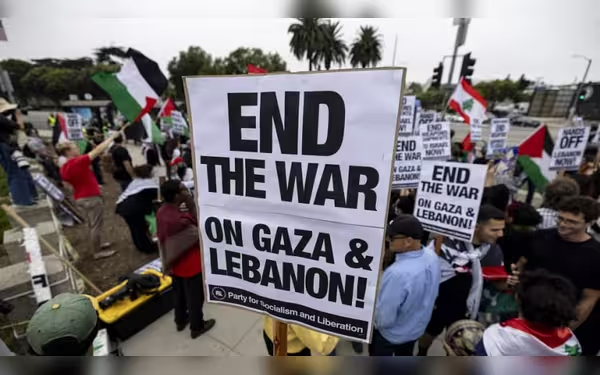Saturday, November 16, 2024 07:32 PM
Gaza Residents Express Solidarity with Lebanon Amid Escalating Conflict
- Gaza residents empathize with Lebanese suffering.
- Israeli airstrikes in Lebanon lead to significant casualties.
- Concerns grow over overshadowing Gaza's ongoing crisis.
 Image Credits: channelnewsasia
Image Credits: channelnewsasiaGaza residents express empathy for Lebanon's suffering amid escalating Israeli airstrikes and ongoing humanitarian crises.
In recent days, the situation in Lebanon has escalated dramatically, with Israeli airstrikes targeting the Hezbollah group, leading to significant destruction and loss of life. This conflict has not only affected Lebanon but has also drawn the attention and concern of people in the Gaza Strip, who are witnessing the unfolding events with a mix of empathy and fear. The ongoing violence has raised questions about the broader implications for the region, particularly for those living in Gaza, who have already been enduring relentless bombardment.
On September 25, Israel conducted its third consecutive day of airstrikes against Lebanon, claiming to target weapons caches and infrastructure linked to Hezbollah. This military action comes after a series of violent exchanges that have resulted in the deaths of at least 558 people in Lebanon, marking one of the deadliest days since the civil war that lasted from 1975 to 1990. The situation escalated following the unprecedented attack on southern Israel on October 7, which prompted Hezbollah to retaliate in solidarity with Hamas, another group backed by Iran.
Residents of Gaza, like Chadi Nawfal, a 24-year-old who lost his home to an Israeli strike, expressed their sorrow over the devastation in Lebanon. Nawfal stated, "The bloody scenes from Lebanon that we see on our television screens are very harsh images. We people in the Gaza Strip are the only ones who can currently feel the pain that the Lebanese people are experiencing." This sentiment reflects a shared suffering among those in both regions, as they grapple with the consequences of ongoing violence.
The recent airstrikes in Lebanon have been part of a broader pattern of conflict that began with coordinated attacks involving Hezbollah's communication devices. These initial explosions resulted in 39 deaths and nearly 3,000 injuries, followed by further strikes that killed key Hezbollah commanders. The Israeli government, led by Prime Minister Benjamin Netanyahu, has stated its commitment to ensuring the safety of its citizens, many of whom have been displaced due to the conflict.
Ayman al-Amreiti, another resident of Gaza City, voiced concerns that the focus on Lebanon might overshadow the ongoing crisis in Gaza. He remarked, "The military weight is now shifting to Lebanon, so even the media attention on the Gaza Strip has become secondary. This encourages the appetite of the occupation (Israel) to commit more crimes." This perspective highlights the fear that the plight of Gazans may be forgotten amid the escalating violence in Lebanon.
As the conflict continues, the death toll in Gaza has reached alarming levels, with reports indicating that at least 41,495 people have lost their lives, primarily civilians. The stark reality is that, regardless of the specific location of the fighting, it is innocent people who bear the brunt of the violence. Umm Munzir Naim, a 52-year-old resident, drew parallels between the two conflicts, stating, "The war against Lebanon and Hezbollah is a war like in Gaza. The victims are the people. They say it's against Hamas and Hezbollah, but on the ground it's people who die." This observation underscores the tragic human cost of war, which often goes unnoticed amid political rhetoric.
In light of these developments, many hope for a swift resolution to the conflicts in both Lebanon and Gaza. Amreiti expressed a desire for peace, suggesting that any settlement with Hezbollah could potentially lead to a ceasefire in Gaza as well. He stated, "Right now, that is the hope that the children of the Palestinian people are turning to." This hope for peace is a sentiment shared by many, as families on both sides yearn for an end to the violence that has disrupted their lives.
As the situation evolves, it is crucial for the international community to pay attention to the humanitarian crises unfolding in both Lebanon and Gaza. The shared experiences of suffering and loss among the people in these regions serve as a poignant reminder of the need for dialogue and understanding in the pursuit of lasting peace. Only through collective efforts can the cycle of violence be broken, allowing for a future where all individuals can live in safety and dignity.













